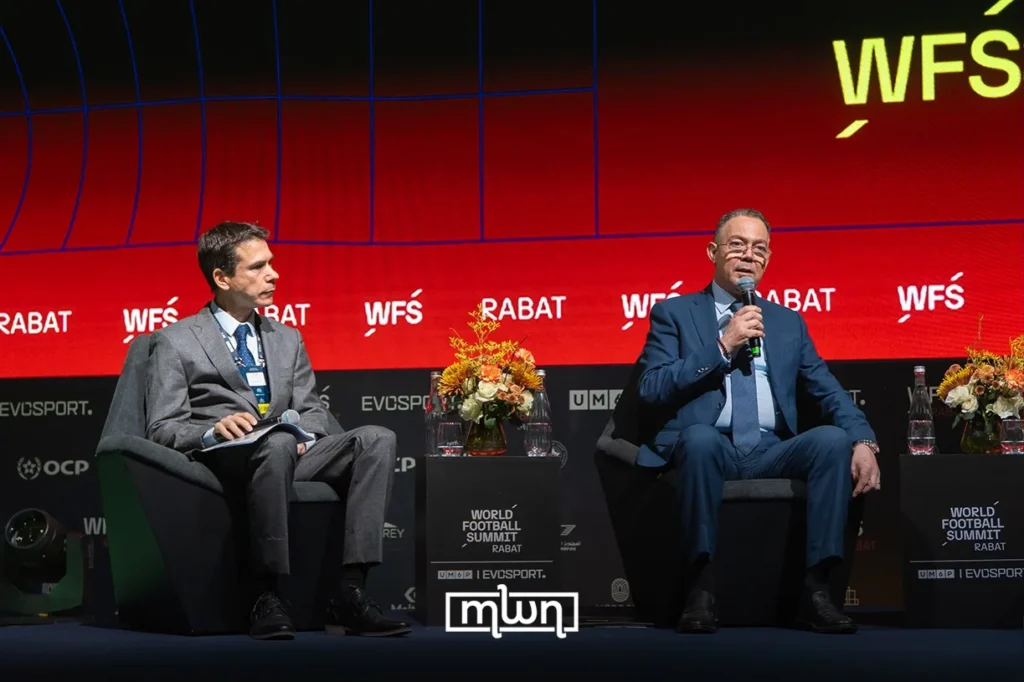Morocco makes his ambition to become a global football work and organizes the first world football summit on African soil in cooperation with Evosport.
The two -day event took place at the state -of -the -art Mohammed VI Polytechnic University and welcomed over 1,000 delegates from 47 countries. In addition to the panels and photo ops, the summit put the sporty infrastructure of Morocco, the diplomatic range and the wider development agenda on the market.
“The world of football goes far beyond the 90 minutes on the field – or 120 in extra time,” said Fouzi Lekjaa, President of the Moroccan Football Association, during the opening committee of the World Football Summit (WFS). “Football is permeated with values: well -being, mutual respect, social cohesion and unity. It is a powerful driver of inclusion. That is why we are here in Morocco.”

With the 2030 Fifa The World Cup threatens – organized together with Spain and Portugal – Morocco sees more than a logistical role.
“This bid is not about geography or convenience – it’s about inheritance, unity and a future together,” said Lekjaa. “Morocco is a country of deep history and civilization. A bridge between Africa and Europe – not the prestige, but reminds the youth of their common legacy.”
The 2030 edition will be historical: the first two continents and the 100th anniversary of the World Cup. For Morocco, it is another chapter in a long -term strategy to use football for development, youth and cultural diplomacy.
“We want to use the global spotlight to present the heritage of Morocco and at the same time promote our youth.”
A man who is already increasing Morocco’s football references is the national coach Walid Regragui, who is the Atlas Lions to an unprecedented World Cup semi-final in Qatar, but the product of long-term planning.

“What we have achieved send a message to the continent,” said Regragui. “It has proven that Africa can compete with the best – if things are done correctly, step by step.”
He attributes Mohammed VI Academy, Morocco’s talent factory. “Four or five players from the Academy came at the World Cup. There is a process – some want to hurry.”
Nevertheless, he warned that more trust in African trainers and administrators must be set up.
“Unfortunately, we still don’t have the same credibility as the players. There is this inferiority complex, this conviction that foreign trainers are better. But Qatar has proven differently.”
His views vibrate in diplomatic circles. Enrique Ojeda Vila, Spain’s ambassador in Morocco, described the tournament as a vehicle for more than just sport.

“We talk about mobility, infrastructure and people together,” he said to Morocco World News. “I am pleased that Spain is part of it – with our Portuguese and Moroccan friends.”
Jan Alessie, co -founder of the World Football Summit, described Morocco as a “natural choice”.
“The football history here is unsurpassed. And the passion of the Moroccan fans – also unsurpassed. That was clear in Qatar.”
Morocco’s efforts are visible on site: new stadiums, humming youth academies, a polished national training center and a packaged tournament calendar – from the U17 Africa Cup of Nations to the U17 World Cup of women in the course of this year.

Ismail Lyoubi, head of EvoSport at UM6P, said Morocco deserved his place.
“Through material achievements, Morocco has demonstrated that it can develop football – and can have sport in a broader sense. We want to promote meaningful cooperation and provide concrete results for the global football community.”
In short, Morocco builds more than a tournament. A legacy. A footprint. A future. Or as Regragui put it: “This World Cup was confirmation that if you build correctly, you can compete with the best.”





